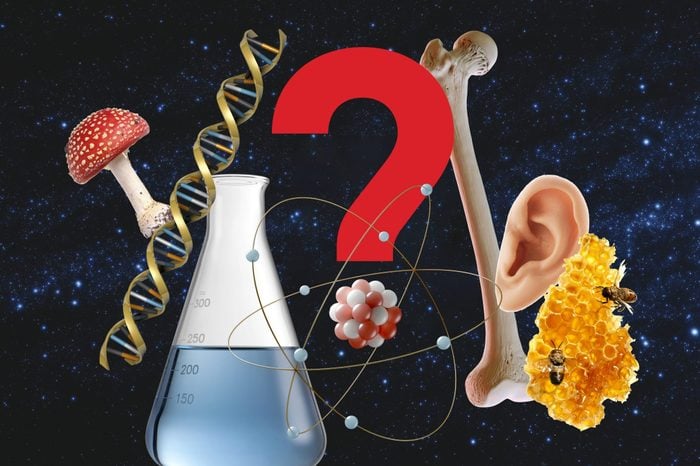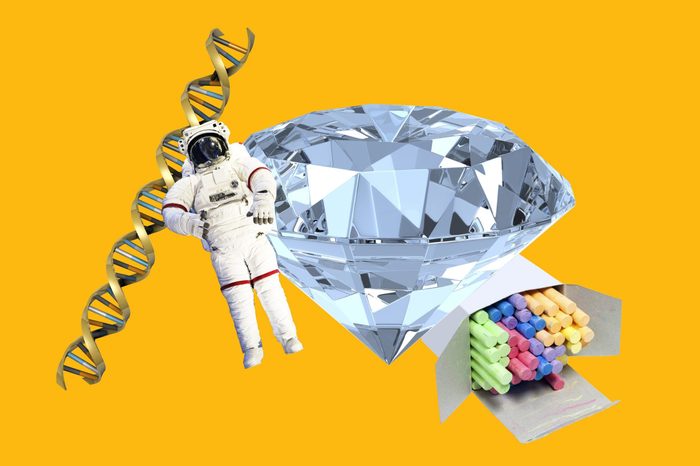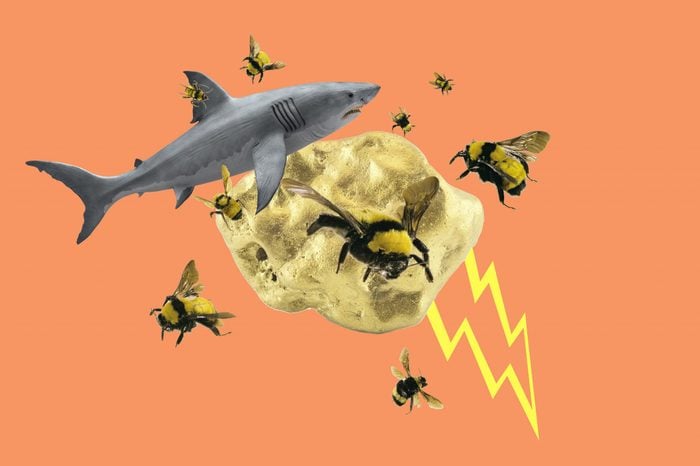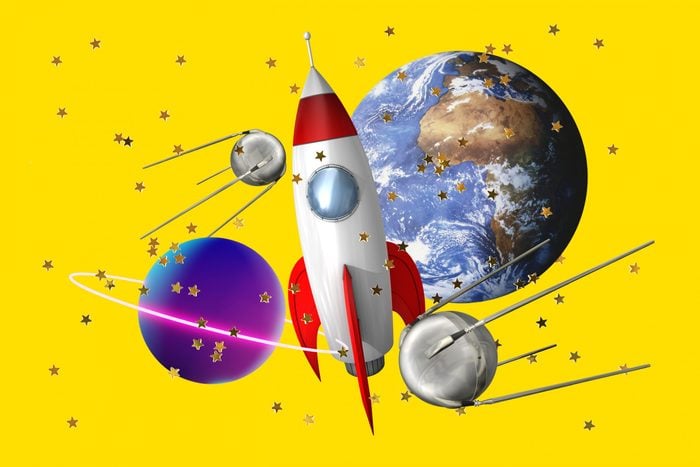
If you’re a fan of science trivia, you may already know the answers to some of these tricky scientific questions. There are so many amazing science facts that are weird, wacky, and true. Many interesting facts in all areas of the sciences like biology, astrology, and physics can be turned into fun trivia questions.
A lot of people get stumped by what can seemingly be a simple science question—even when it comes to kids’ trivia. Some of the more difficult trivia questions below may surprise you. See how many you can answer correctly.

Easy science trivia
1. Trivia question: The concept of gravity was discovered by which famous physicist?
Answer: Sir Isaac Newton. And speaking of gravity, did you know that there are normal things astronauts can’t do in space?
2. Trivia question: How many colors are in the rainbow?
Answer: Seven. (Psst, there are so many cool facts about rainbows).
3. Trivia question: True or False? Electrons are smaller than atoms.
Answer: True.
4. Trivia question: What is the name of the tallest grass on earth?
Answer: Bamboo.
5. Trivia question: Which is the most abundant element in the universe?
Answer: Hydrogen.
6. Trivia question: What is the hardest natural substance on Earth?
Answer: Diamond.
7. Trivia question: What is the study of mushrooms called?
Answer: Mycology. And if mushrooms could talk, here’s what they’d tell you.
8. Trivia question: Can an airplane go in reverse?
Answer: Yes.
9. Trivia question: Does sound travel faster in the air or in water?
Answer: Water.
10. Trivia question: Which oath of ethics taken by doctors is named after an Ancient Greek physician?
Answer: The Hippocratic Oath.

Hard science trivia
11. Trivia question: What is the largest desert in the world?
Answer: It’s not the Sahara, but actually Antarctica!
12. Trivia question: True or False? Lasers work by focusing on sound waves.
Answer: False. “Laser” is actually an acronym that stands for Light Amplification by Stimulated Emission of Radiation. Lasers concentrate light waves, not sound waves.
13. Trivia question: What does DNA stand for?
Answer: Deoxyribonucleic acid.
14. Trivia question: Do diamonds last forever?
Answer: No. Diamonds do not last forever. They’ll eventually degrade to graphite, though the process takes over a billion years.
15. Trivia question: What is a material that will not carry an electrical charge called?
Answer: An insulator.
16. Trivia question: Will there be an impact on your height if you go to space?
Answer: Yes. You will be taller because you’ll no longer be subjected to gravity. And did you know that outer space actually has a smell?
17. Trivia question: At what temperature are Celsius and Fahrenheit equal?
Answer: -40.
18. Trivia question: Roughly how long does it take for the sun’s light to reach Earth: 8 minutes, 8 hours or 8 days?
Answer: 8 minutes.
19. Trivia question: How do airplanes stay in the air?
Answer: Planes stay in the air because of the shape of their wings. Air moving over the wing gets forced downwards, which pushes the wing up. This push is stronger than gravity, and so makes the plane fly. There’s also a reason why airplane windows are round.
20. Trivia question: What is chalk made of?
Answer: It comes from limestone, which formed from the shells of tiny marine animals.

Science trivia about nature
21. Trivia question: Which freezes faster, hot water or cold water?
Answer: Hot water freezes faster than cold, known as the Mpemba effect.
22. Trivia question: On what continent will you not find bees?
Answer: Antarctica.
23. Trivia question: What is the only rock that floats?
Answer: Pumice. It forms from the froth at the top of lava flow, which cools very rapidly.
24. Trivia question: True or False? Chameleons change colors only to blend into their environment.
Answer: False. Chameleons also change colors for other reasons, like to regulate body temperature, when feeling aggression, and when feeling excited.
25. Trivia question: Can lightning strike the same place twice?
Answer: If you answered no to this science trivia question, you’re wrong. It is actually more likely that lightning will strike the same place twice.
26. Trivia question: True or false? Shark cartilage can cure cancer.
Answer: Unfortunately, many still believe that shark cartilage can cure cancer, leading to the killing of sharks. That’s false, and scientists now have proof that there are sharks with cancerous tumors themselves.
27. Trivia question: How long is the memory of a goldfish?
Answer: Most people would say that goldfish only have a three-second memory. However, their memories actually last for several days.
28. Trivia question: What mountain peak is farthest from the center of the Earth?
Answer: Many may think the answer to this science trivia question is Mount Everest. However, the peak of Chimborazo in Ecuador is the farthest from the center of the earth.
29. Trivia question: How many bones do sharks have in their bodies?
Answer: Zero! Instead, they have powerful, flexible cartilage. Sharks are fascinating, if a bit misunderstood.
30. Trivia question: Can gold be created from other elements?
Answer: Yes. It is possible to create gold from other elements, but it’s so complicated and expensive that it would cost you more to make it than to buy it.

Science trivia about the body
31. Trivia question: What is the heaviest organ in the human body?
Answer: The liver.
32. Trivia question:How does fat leave your body when you lose weight?
Answer: Through your sweat, urine, and breath.
33. Trivia question: From which body part does the majority of your body heat escape?
Answer: This is a trick science trivia question. Most people think the answer is your head, but you lose heat evenly throughout your body.
34. Trivia question: How many senses do humans have?
Answer: Thought the answer was five? You actually have more—many neurologists identify nine or more senses. Fun fact: There are also things dogs can smell that humans can’t.
35. Trivia question: Which blood type is the rarest in humans?
Answer: AB negative.
36. Trivia question: How many teeth does an adult human have?
Answer: 32.
37. Trivia question: How many bones are in the human body?
Answer: 206.
38. Trivia question: What part of the human body serves the purpose of maintaining balance?
Answer: The ears.
39. Trivia question: Who has more hair follicles, blondes or brunettes?
Answer: Blondes.
40. Trivia question: What color is the blood inside your body?
Answer: Dark red. Although your veins appear blue, human blood contains hemoglobin and hemoglobin is a red protein, so the blood in your body is dark red.

Science trivia about space
41. Trivia question: What is the only planet that spins clockwise?
Answer: Venus.
42. Trivia question:Can humans see the Great Wall of China from space?
Answer: No. Unless you’re in low orbit “under a specific set of weather and lighting conditions,” according to Scientific American. Unfortunately, the Great Wall’s composition of clay and stone simply blends in too much to the surrounding landscape for anyone to make it out with an unaided eye from orbit.
43. Trivia question: Is Pluto a planet?
Answer: No. Pluto used to be identified as a planet in our solar system, but it is now classified as a dwarf planet. See more facts you’ve always believed that are actually false.
44. Trivia question: What was the name of the first man-made satellite launched by the Soviet Union in 1957?
Answer: Sputnik 1.
45. Trivia question: What is the biggest planet in our solar system?
Answer: Jupiter.
46. Trivia question: Which planet is closest to the sun?
Answer: Mercury.
47. Trivia question: Does the earth go around the sun, or does the sun go around the earth?
Answer: This is an easy piece of earth trivia: The earth goes around the sun.
48. Trivia question: True or False? All radioactive material is man-made.
Answer: False. The sun and stars emit cosmic radiation that interacts with the earth’s atmosphere. There’s also naturally radioactive material in soil, water, and vegetation.
49. Trivia question: Is the earth flat or round?
Answer: Humans have known that the earth is round since the time of Ancient Greece.
50. Trivia question: True or False? The center of the earth is very hot.
Answer: True. The temperature of Earth’s core is almost 11,000 degrees Fahrenheit—as hot as the surface of the sun.
For even more trivia, check out these general trivia questions that will put your knowledge to the test.
Sources:
- Mayo Clinic: When you lose weight, where does the lost body fat go?
- Scientific American: Is China’s Great Wall Visible from Space?
- Encyclopedia Britannica online: Can Lightning Strike the Same Place Twice?
